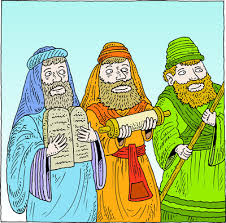John 9:28 – and they reviled him, saying, "You are his disciple, but we are disciples of Moses."
Jesus has just healed a blind beggar who was sitting outside the temple gates.

You would think this was cause for celebration – it showed the Jews that God was in their midst. But there were certain Pharisees who despised and rejected Jesus. Instead of rejoicing at this miracle, they set out to discredit both Jesus and his work.
As we saw in our last post, their 'investigation' did nothing except confirm the validity of this miracle! When the Pharisees realized they could not refute Jesus or disprove the miracle, they resorted to arguing with the beggar like spoiled little children. This is typical of people who cannot win an argument with truth or reason.
John tells us that the Pharisees 'reviled' the beggar. The Greek word for 'revile' literally means 'a spear word'. The meaning is that they spoke cutting, piercing, words which revealed the murderous intent of their hearts. If the Pharisees had the same power with a literal sword as they did with their tongues, they would have killed the beggar!
The Pharisees have basically drawn a line in the sand.
On one side, they placed Moses, the law he gave to Israel, and all those who follow that law. On the other side they placed Jesus, the gospel he was teaching and all those that believed he was the Messiah.
In their misguided and ignorant opinion, they believed that these two things (the Law of Moses and the teachings of Christ) were mutually exclusive. In other words, the Pharisees believed that anyone who followed Christ was automatically an enemy of Moses and the Law.
Matthew 5:17 - Think not that I am come to destroy the law, or the prophets: I am not come to destroy, but to fulfill.
What they did not understand (because they chose to be spiritually blind) was that the law and grace both flowed from God. They were not opposites of each other; they complimented each other. Moses was a type or shadow of the Messiah that was to come (Jesus). Jesus, the true Messiah, was the fulfillment of the Mosaic Law.
Therefore, it was entirely possible to be a disciple of Moses as well as a disciple of Jesus.
John 9:29 – "We know that God has spoken to Moses, but as for this man, we do not know where he comes from."
When the Pharisees say this, they are not referring to the place where Jesus was born. They are referring to his commission or his prophetic office.
The scriptures show that Moses was commissioned by God. He received his calling at the burning bush (Exodus chapter 3). His calling/commission was confirmed to the Hebrews by the performance of miracles:
Exodus 4:1-3 - And Moses answered and said, But, behold, they will not believe me, nor hearken unto my voice: for they will say, The LORD has not appeared unto you. And the LORD said unto him, What is that in your hand? And he said, A rod. And he said, Cast it on the ground. And he cast it on the ground, and it became a serpent; and Moses fled from before it.
God gave Moses the ability to perform two other miracles (making his hand leprous and turning water into blood. See Exodus chapter 4). Notice the purpose of the miracles – to prove that God was speaking to them through Moses.

The Pharisees believed the word of Moses and accepted his doctrine based on the Old Testament record of these three simple miracles. So why would they reject Jesus, when he had performed hundreds of miracles, many right in front of them? The only answer is their stubborn refusal to listen to God.
Do we ever refuse to listen to God? Do we stick to a doctrine that claims God does not heal today, even though we have evidence to the contrary? Do we stick to a doctrine that says speaking in heavenly languages (tongues) is not for today, even though millions of people are doing it right now? Examine what you believe and make sure it lines up with the word of God.
John 9:30-31 – The man answered, "Why, this is an amazing thing! You do not know where he comes from, and yet he opened my eyes. We know that God does not listen to sinners, but if anyone is a worshiper of God, and does his will, God listens to him."
The beggar is getting a bit sassy with the religious leaders and I like it! He boldly mocks their ludicrous claim that Jesus was not commissioned/sent by God.
He points out that God does not listen to any deceiver or false teacher; no such person could possibly work a miracle. Since Jesus had just healed him, the only logical conclusion is that Jesus operates under the authority of God. Therefore, his doctrine should be accepted.
We find that this uneducated, poor and despised beggar is able to correctly judge spiritual matters, while the religious leaders stand by, dazed and confused. How is that possible? After all, it was the business of the religious leaders was to distinguish good from evil, or a true prophet from a false one. Yet the Pharisees cannot correctly judge the clear case that is before them!
The only answer is that God cured not just the beggar's physical blindness, but his spiritual blindness as well!
John 9:32 – "Never since the world began has it been heard that anyone opened the eyes of a man born blind."
When the beggar made this statement, he was no doubt referring to the physical realm. Blindness was (and for the most part still is) incurable.
But interestingly, his statement is true in the spiritual realm as well.
Since the beginning of the world, no one has been able to open the spiritual eyes of a person afflicted/born in sin. The understanding of mankind is blind because:
- Sin has affected our entire nature; it has cut us off from God and spiritual understanding.
- Our natural pride and self-reliance strive against the message of the gospel, which says that out salvation is 100% a gift of God; we cannot earn it.
- We try to judge spiritual things by the use of our senses. This was a known problem of the religious leaders; Jesus instructed them to stop judging by appearance and judge righteously (John 7:2).
Rhetoric, argument and reason are useless in the fight against sin/spiritual blindness. Only the divinely inspired and Spirit-breathed word of God has the power to heal spiritual blindness and draw men to Christ. Man remains blind until the Spirit says, 'Let there be light'.
For this reason, we need to fill our minds and hearts with the word of God. Then, when we open our mouths and speak out of the abundance of our hearts (Luke 6:45), our words can bring life to those who hear them.
John 9:33 – "If this man were not from God, he could do nothing."
The beggar correctly concludes that the work of Jesus is beyond the power of any ordinary man. If Jesus did not have some special authority from God, he could not perform such miracles.
Notice that the beggar still thinks of Jesus as a prophet; he stops just short of declaring Jesus to be divine. He has not quite come to that revelation yet, but he soon will!
John 9:34 – They answered him, "You were born in utter sin, and would you teach us?" And they cast him out.
At this point, the Pharisees realized that they cannot accomplish their goal – they cannot refute this miracle of Jesus. Their frustration manifests itself in angry retort directed at the beggar.
They resolutely declare that he was 'born in utter sin'. This refers to a false belief that was common during that time. Many people (including some Jews) were convinced that souls, after finishing one life, entered into new bodies where they suffered the punishment of their former crimes. Since this man was born blind, they conclude that he was a vile sinner in his last life.
 Obviously, we know this is not the case. But there is still a lesson to be learned here. We should not pass judgment on those who are suffering. As we noted in our previous posts, suffering can be punitive, redemptive or collateral. God uses suffering to accomplish eternal good in us and others. When we see someone suffering, we cannot possibly know the real reason for it, so we should not judge it.
Obviously, we know this is not the case. But there is still a lesson to be learned here. We should not pass judgment on those who are suffering. As we noted in our previous posts, suffering can be punitive, redemptive or collateral. God uses suffering to accomplish eternal good in us and others. When we see someone suffering, we cannot possibly know the real reason for it, so we should not judge it. The judgment of the Pharisees had another unfortunate (and serious) side effect. It caused them to distain the beggar, which in turn caused them to reject the sound spiritual warnings he gave to them. Because of their pride and arrogance, they missed another chance to find grace.
As a final insult, they excommunicate this man from the temple.
John 9:35-36 – Jesus heard that they had cast him out, and having found him he said, "Do you believe in the Son of Man?" He answered, "And who is he, sir, that I may believe in him?"
The beggar has had quite an eventful day. The day began as hopeless as any other. But then he was healed, had a confrontation with the religious leaders, and was excommunicated from the synagogue. As he was wandering outside, Jesus came to him with an important question – did he believe in the Messiah?
We can't help but notice how Jesus leads this man along in his faith, much as he did with the woman at the well.
At the beginning of this narrative, the beggar understood very little about the character of Jesus. He certainly believed that Jesus had the power to heal him and from that he inferred that Jesus was a prophet (verse 17). He testified as much to the religious leaders.
But now Jesus stretches his faith. Did the beggar believe that the Messiah had come?
We must keep in mind that the beggar had no idea that the man he now spoke with was the same one who had healed him. This allows us to see the true motivation of his heart.
The beggar's response indicates that he was prepared to acknowledge the Messiah when he saw him; he just didn't know who he was. In fact, he wished that someone would point the man out to him, so he could both see and hear the Son of God.
John 9:37-38 – Jesus said to him, "You have seen him, and it is he who is speaking to you." He said, "Lord, I believe," and he worshiped him.
The beggar is now fully convinced of the divinity of Jesus and glorifies him as Savior. While his spiritual journey is far from over, he has made the transition into the kingdom of heaven.
It is likely that this ends John's narrative about the beggar. Some amount of time passes between verses 38 and 39.
John 9:39 – Jesus said, "For judgment I came into this world, that those who do not see may see, and those who see may become blind."
Again, at some later date, Jesus is teaching and some of the religious leaders are listening in as Jesus explains the effects of his appearance in the world.
Every single person is born spiritually blind. Now that Messiah has come into the world bringing the truth, men have a choice to make.
People who recognize and admit they are sinners can receive spiritual sight/understanding and accept the gift of salvation. These people have passed from death to life. They are no longer under God's condemnation:
John 5:24 - Verily, verily, I say unto you, He that hears my word, and believes on him that sent me, has everlasting life, and shall not come into condemnation; but is passed from death unto life.
The life of the blind beggar was a physical example of this spiritual truth.
People who refuse to admit that they are sinners (spiritually blind), will not be able to accept the gift of salvation, because they don't think they need it. They will despise and reject the gospel message. As a result, they remain in spiritual darkness or blindness, and they fall under condemnation.
Matthew 23:27-28 - Woe unto you, scribes and Pharisees, hypocrites! For you are like unto whited sepulchers, which indeed appear beautiful outwardly but are within full of dead men's bones, and of all uncleanness. Even so you also outwardly appear righteous unto men, but within you are full of hypocrisy and iniquity.
The lives of some of the Pharisees presented a physical example of this truth.
Scholars also see a bigger picture here as well. They believe that the meaning of this verse goes beyond each individual and refers to the Jews and Gentiles. It can be said that the gospel/salvation message was taken away from the Jews because they rejected it, and given to the Gentiles who received it with joy (Romans chapter 11).
John 9:40-41 – Some of the Pharisees near him heard these things, and said to him, "Are we also blind?" Jesus said to them, "If you were blind, you would have no guilt, but now that you say, 'We see', your guilt remains."
What is Jesus saying here?
The context of his comment is still the blind beggar. He was physically blind and he knew it. In fact, he was acutely aware of it. This knowledge caused him to seek a cure for his blindness. Man could not help him, but eventually Jesus crossed his path and healed him.
 On the other hand, no one else in this narrative (including the Pharisees) asked Jesus to heal their blindness, because they didn't have any. They believed they could see perfectly.
On the other hand, no one else in this narrative (including the Pharisees) asked Jesus to heal their blindness, because they didn't have any. They believed they could see perfectly. Spiritually speaking, sin is like blindness. If you realize you have it, you can seek God. You can ask him to heal/forgive/remove your sin, just as the beggar asked Jesus to heal his eyes. Once you do, you are free from guilt/condemnation.
But if you refuse to believe that you have any blindness/sin, then naturally you will not seek God for a cure, because you falsely believe you are in perfect spiritual health. Therefore, since you did not seek a remedy for your sin, it stays with you and your guilt before God remains. This is the situation of many of the religious leaders of that day.
Let me offer you some encouragement:
Jesus performed hundreds of miracles on earth, yet his miracle power is not diminished in the least. Are you in need of a miracle today? Don't let someone convince you that God is no longer in the miracle business.
Remember, we receive the blessings of God by faith. So take steps to build up your faith and ask God for whatever is on your heart. He is a good Father, and he wants to bless you!
Let me offer you some relief:
There are many good reasons why Jesus instructs us not to judge each other.
For one thing, we cannot possibly understand the motivations of another person. Only God can do that (Hebrews 4:12). Therefore, only God can righteously judge their situation.
Another reason we are not qualified to judge is because we too have sin in our lives. Jesus tells us not to pull the splinter out of our brother's eye until we have removed the log from our own (Matthew 7:3-4)!
Fortunately for us, Jesus instructs us not to judge others (Matthew 7:1). Frankly, that is a relief – I don't want the responsibility of judging someone else!
Let me offer you some strength:
The beggar provides an excellent example of strength that we can learn from:
The Pharisees were wealthy, popular and educated. Very few Jews would disagree with them or confront them. But the beggar wasn't afraid to stand up for the truth, even though he knew they would despise his opinion.
The Pharisees behaved like school bullies. If any Jew failed to agree with them, they would use their authority to banish them from the temple. But the beggar didn't bend to that kind of pressure. His stand for the truth did eventually get him excommunicated from the temple, but in the long run it was worth it – he found Christ.
In this day and age, it takes a lot of strength to stand up to the wicked compromising world around us, but if we stay close to Christ, he will give us the strength we need to stand strong in our faith.
